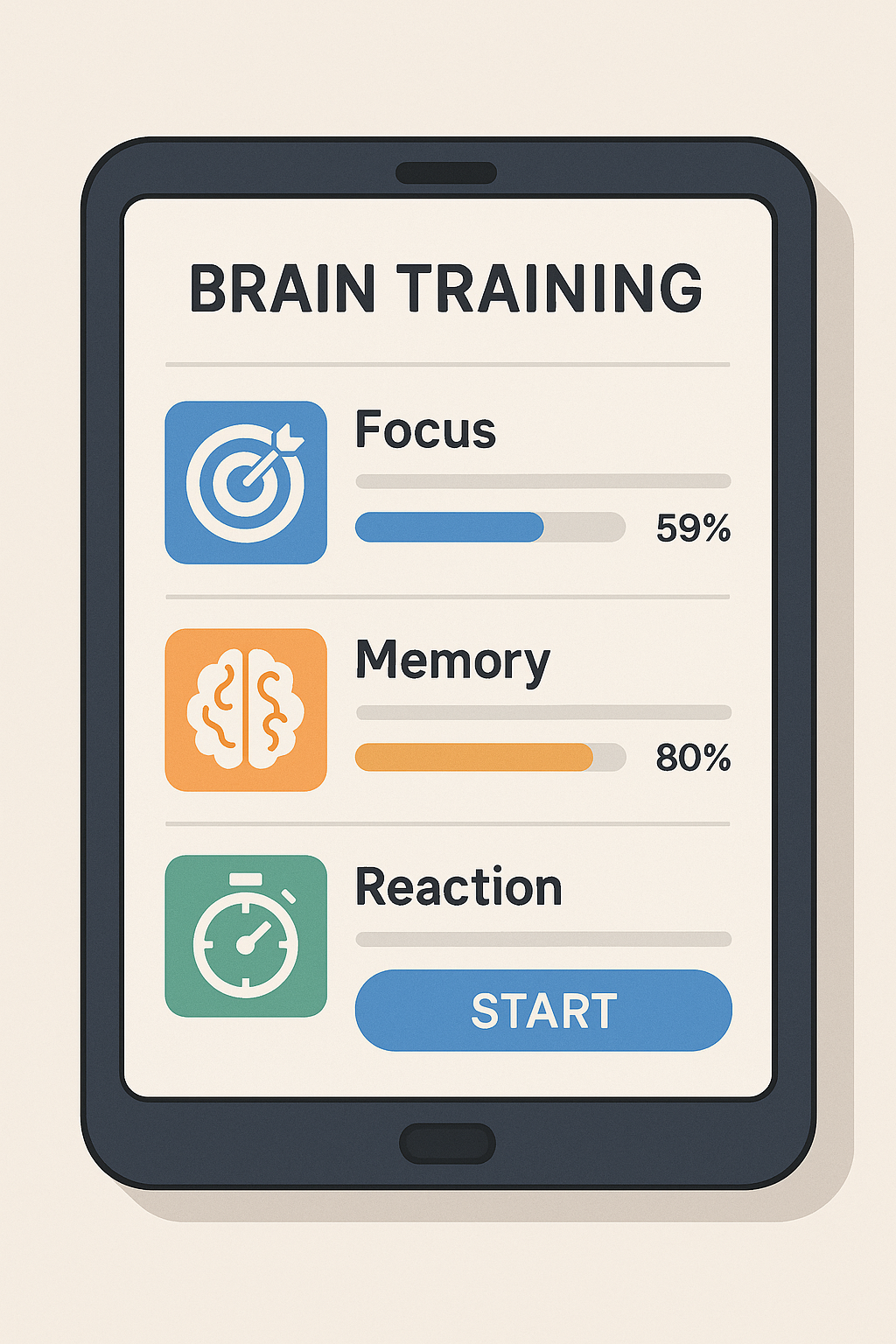<!–
SEO Title: Brain Training Apps to Improve Focus and Memory
Slug: brain-training-apps
Meta Description: Discover brain training apps that enhance memory, focus, and mental clarity using adaptive neuroscience-based methods.
Focus Keyword: brain training apps
–>
In a world wired for distraction, mental clarity is your most valuable currency. Every message ping, open tab, or social scroll chips away at the capacity to think deeply. Brain training apps exist not to entertain, but to restore what modern workflows erode: focus, memory, and strategic thinking. They’re not hacks — they’re tools that strengthen your mind’s architecture through repeated cognitive challenge.

How Brain Training Apps Strengthen Focus Under Pressure
When you’re under deadline, pitching investors, or debugging code late at night, your success depends on one thing: focused execution. Yet high-pressure environments often break focus rather than build it. Brain training apps simulate mental strain in short, controlled exercises — decision-making under time limits, memory under interference, attention despite noise. These micro-stressors build tolerance to real-world chaos.
Take a product manager juggling overlapping deadlines. Using reaction drills in an app like Elevate, she sharpens decision speed and eliminates hesitations. The neural circuits involved — response inhibition, working memory — overlap directly with the ones she needs in meetings. Over weeks, she reports faster task switching and better cognitive endurance. That’s the hidden power of brain training: it makes pressure your ally, not your enemy.
Why Professionals Use Mental Fitness as a Strategic Edge
The knowledge economy doesn’t reward effort — it rewards clarity. Founders, designers, strategists all rely on their cognitive output. And like athletes, they now use tools to maintain mental form. Brain training apps offer structured cognitive workouts — measurable, repeatable, adaptive. Instead of vague self-improvement, users get specific drills: attention, processing speed, verbal fluency.
A startup CTO might train with pattern-recognition modules to speed up architectural decisions. A lawyer may use memory exercises to strengthen case retention. These sessions aren’t theoretical — they’re embedded into morning routines or pre-work warmups. In 10 minutes a day, they sharpen the skills that make professionals effective. And the ROI is mental clarity, not just app scores.
The Neuroscience Behind Adaptive Cognitive Training
Your brain rewires based on what you ask of it — this is the essence of neuroplasticity. Brain training apps work because they target specific functions repeatedly: sustained attention, working memory, response time. Unlike passive learning, they require active engagement. This activates neural pathways and strengthens them through repetition.
Advanced platforms adapt to performance. If you ace a focus drill, the next level increases difficulty. If your memory slips, the algorithm pulls you back. This creates a progressive challenge loop — the same principle used in elite athletic training. The result? Not better gaming skills, but a faster, sharper, more resilient brain — optimized for how you work and think every day.
Turning Feedback Loops into Long-Term Motivation
Motivation dies when effort feels invisible. But brain training apps make progress visible. Dashboards, streaks, speed charts — they show you’re improving. Even when gains are small, seeing progress sustains effort. This triggers what’s known in behavioral science as the “effort-reward loop.” You train, see change, repeat. And because the brain loves feedback, it begins craving the next level.
Unlike gamified distractions, these apps build real self-efficacy. You don’t just feel productive — you become mentally sharper. That’s why thousands of professionals return daily. Not for entertainment, but for reinforcement. Progress isn’t abstract — it’s displayed, tracked, and celebrated. And over time, it compounds into a stronger cognitive identity: someone who trains the mind, not escapes it.
What Real-World Improvements Look Like After Training
How do you know it’s working? Not by app scores — but by life performance. Users of brain training apps report remembering names more easily, focusing longer during meetings, and switching tasks without mental lag. A data analyst might process complex spreadsheets faster after visual attention training. A teacher may recall lesson plans without rereading them, thanks to improved working memory.
Even small changes matter: 5% more focus, 10% faster decisions. Over months, these translate to significant cognitive gains. You write faster. You argue clearer. You rest better. Mental load becomes manageable — not because your job is easier, but because your brain is stronger.
Misconceptions About Brain Training (and the Truth)
Some say brain training is a scam. And early apps didn’t help — they promised IQ boosts from five-minute games. But modern brain training apps don’t claim magic. They offer targeted exercises supported by neuroscience. According to Harvard Business Review, adaptive training improves working memory, attention, and processing speed when done consistently.
The key is alignment: train what matters. Want to avoid distractions? Use impulse-control drills. Want sharper decisions? Use logic-speed tests. Apps that adapt and provide data-backed feedback outperform random exercises. And while they won’t replace sleep or therapy, they will enhance your ability to show up focused — every single day.
How to Integrate Brain Training into a Busy Life
No time? That’s a myth. Most effective users spend 5–10 minutes per day. Before calls. During breaks. As a post-work cool-down. By linking training to existing routines — coffee, lunch, shutdown — it becomes automatic. Like brushing teeth, but for your brain.
Even better: pair it with analog habits. After a memory drill, write three ideas in a notebook. After a logic round, journal for five minutes. These stacks multiply gains. Brain training apps don’t demand time — they reward consistency. And when integrated well, they transform moments of downtime into micro-upgrades for your mind.
Explore More
Final Thoughts: Train the Mind, Master the Work
Your mind is your edge. And like any edge, it dulls without sharpening. Brain training apps aren’t magic — they’re maintenance. They help you think better, faster, deeper. And in a world of distraction, that’s your differentiator.
Don’t wait until burnout. Start when you’re sharp. Train when it’s easy — so you’re ready when it’s not.
